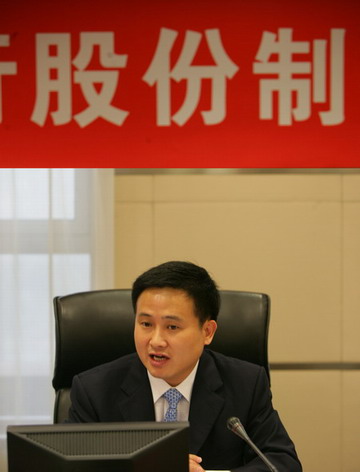 |
|
Headquarters of Agricultural Bank of China (ABC) is seen here in this photo taken on October 21, 2008. The bank announced Wednesday that it will receive $19 billion from the government, the first step toward its planned initial public offering. [CFP]
|
Agricultural Bank of China (ABC) said Wednesday it will receive $19 billion from the government, the first step toward its planned initial public offering.
Central Huijin Investment Ltd, a unit of China's sovereign wealth fund, will inject capital into the lender, Pan Gongsheng, the bank's vice-president, told a news conference in Beijing Wednesday. After the injection, Central Huijin and the Ministry of Finance each will have 50 percent stakes in the lender.
The bank will put its 817.97-billion yuan bad loans into a fund, which will also be overseen by the Ministry of Finance. It may take five years to dispose of the impaired assets, Pan was quoted by Reuters as saying.
ABC also intends to issue 20 billion yuan worth of subordinate bonds as part of its financial restructuring and it is still considering whether to sell stakes to strategic investors.
 |
|
Pan Gongsheng, Vice-President of Agricultural Bank of China (ABC) speaks at a press confrence in Beijing Wednesday October 22, 2008. Pan said the bank will receive $19 billion from the government, the first step toward its planned initial public offering. [CFP]
|
"The bank will need the funds to strength its balance sheet before the share sale," said Wu Yonggang, an analyst from Shanghai-based Guotai Junan Securities. " It may also seek a dual listing in Shanghai and Hong Kong, given its size."
The third largest bank in China had a non-performing loan ratio of 23.5 percent at the end of last year, the highest among China's Big Four commercial banks and about four times the industry average of 5.6 percent.
Analysts say uncollected loans are largely due to its traditional role in providing funds to support the nation's less-developed rural economy. Top officials from the lender also said earlier that it received 300 billion yuan in bad assets from other State-owned lenders over the years, as they tried to transform into profit-driven commercial banks.
The injection is part of the government's decade-long effort to restructure major State banks and improve the efficiency of the banking sector. Over the years, the government has spent as much as $500 billion bailing out other State lenders such as Bank of China and China Construction Bank.
"The lender needs to give investors a clear idea of how it plan to improve profitability in the rural market," said Wu.

